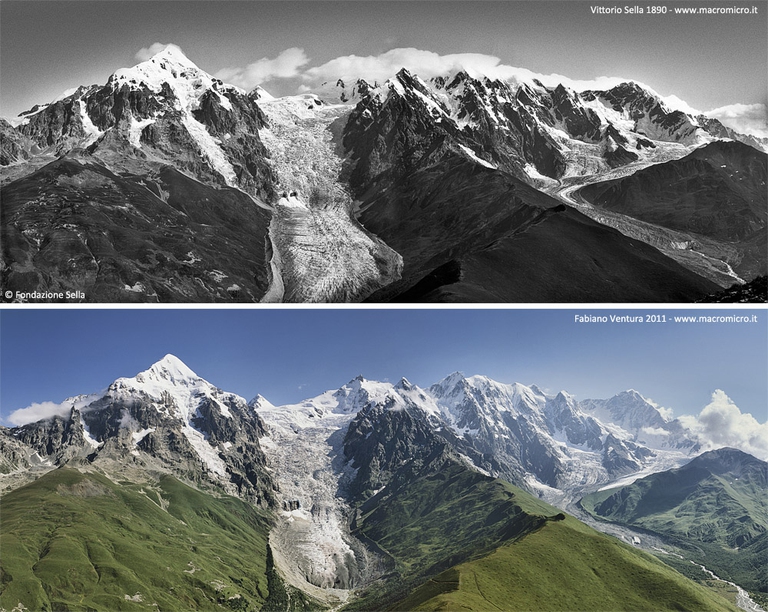
After a landslide led to twelve deaths on the island of Ischia, questions have been raised about the impacts of illegal building, tourism, and climate change.
Mettere a confronto foto di ghiacciai oggi con quelle di 60 anni fa, è il modo migliore per dimostrare come il riscaldamento globale stia cambiando la morfologia delle catene montuose più importanti del mondo.
Is there any better way of documenting ice melting over the last sixty years than comparing two photos in order to prove the retreat of glaciers and snow surface? Fabiano Ventura has launched the photographic and scientific project On the Trails of the Glaciers, which has now reached its fourth expedition, headed to the Tierra del Fuego and the Patagonian Andes.
Started on Thursday the 11th of February, Ventura’s expedition will last two months. After covering 1,000 kilometres and following the tracks of the Italian explorer and priest Alberto Maria De Agostini, brother of Giovanni, the founder of the famed Italian geographic institute, Ventura will meet a group of engineers and geologists. The group of researchers brought together by the GlacioVar project are from Rome’s La Sapienza University and Milan University. They will collect information and create 3D models of some parts of the glacier terminus in order to determine the melting rate of glaciers and conditions of their surface. Moreover, they will verify the presence of debris or black carbon, a component of fine particulate matter. The results will be made available to the scientific community and the Italian Glaciological Committee (CGI).
On the Trails of the Glaciers depends o Macromicro association, which avails itself of professional photographers and has already launched three expeditions: in Karakorum (2009), the mountainous group between Pakistan, India, and China; the Caucasus (2011); and Alaska (2013). The objectives are many: safeguarding natural resources, in particular precious water; showing the importance of scientific research for sustainable development and spreading knowledge; recovering and enhancing a historic and cultural heritage such as photographic archives.
[vimeo url=”https://vimeo.com/84394776″]
The photographs, once compared to the historic ones, are the best scientific proof of global warming. They also confirm what the scientific community has already theorised almost unanimously. The comparison with the past makes climate change irrefutable and comprehensible to anyone. The next expeditions planned will head to Himalaya (2017) and the Alps (2019).
Siamo anche su WhatsApp. Segui il canale ufficiale LifeGate per restare aggiornata, aggiornato sulle ultime notizie e sulle nostre attività.
![]()
Quest'opera è distribuita con Licenza Creative Commons Attribuzione - Non commerciale - Non opere derivate 4.0 Internazionale.
After a landslide led to twelve deaths on the island of Ischia, questions have been raised about the impacts of illegal building, tourism, and climate change.
Not much snow, peaks of 19 degrees Celsius in Norway and even 28 degrees in France: official data confirms the anomalously high temperatures of this past winter.
Ocean warming has risen to record highs over the last five years: just in 2019 the heat released into the world’s oceans was equivalent to that of 5-6 atomic bombs per second. The culprit, no doubt, is climate change.
What did Greta Thunberg tell participants at the 2020 World Economic Forum in Davos? Once again, the Swedish activist underlined the total lack of concrete solutions to the climate crisis presented by leaders so far.
The list of human and animal victims of the Australia wildfires keeps growing – one species might already have gone extinct – as the smoke even reaches South America.
Kivalina is located on a small island once guarded by sea ice, which is now melting due to global warming. While the sea threatens to wipe the village off the face of the Earth, its inhabitants refuse to give up their lives and traditions.
Thanks to activists, the voice of the world’s peoples resounded through the COP25 like an alarm bell. Governments didn’t reach the results they demanded, but their cries and messages were stronger than ever, reaching even those who weren’t in Madrid.
Climate change poses a risk for millions. However, women are the most vulnerable to its negative consequences: a few simple considerations by the Italian Climate Network help us perceive the global implications of this.
The COP25 ended two days late and with very few steps ahead made. Climate negotiations in 2020 will be an uphill battle as political will clearly seems to be lacking, once again.









